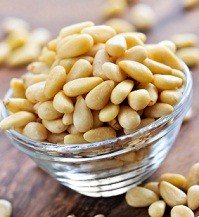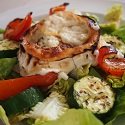Lose Weight
![]() Calories in Food
Calories in Food
![]() Calories in Nuts
Calories in Nuts
![]() Calories in Pine Nuts
Calories in Pine Nuts
Calories in Pine Nuts and
Nutrition Facts
How many calories in Pine Nuts? See below, the Pine Nut calories for the different serving sizes. We provide you with Pine Nuts nutrition facts and the health benefits of Pine Nuts to help you lose weight and eat a healthy diet.
Pine Nuts aren’t really nuts. They are the seeds that we get from pine cones. There are a lot of varieties depending on the continent you are in and due to this the nutritional amounts will vary.
Pine Nuts are lower in saturated fat than other nuts but still reasonably high (just over 50%) in both mono and poly unsaturated fats (the good fat). They are high in protein, calcium, magnesium, phosphorus, potassium, folate (folic acid), vitamins A and K with a good level of phytosterols which are thought to help against heart disease as they can lower cholesterol. They also contain no cholesterol. They are an excellent source of fiber giving you a fuller feeling. Pine Nuts also contain pinolenic acid which has been shown to curb the appetite. Other Pine Nut benefits include maintaining a healthy blood pressure and heart rate.

It is considered that if you eat a portion of nuts (30 grams) about twice a week, it was reported in a journal called "Obesity", that you are less likely to gain weight than those who do not eat nuts.
Compare calories in Pine Nuts with the other calories in nuts.
Calories in Pine Nuts, Dried *
Refuse: 23% (Shells)Scientific Name: Pinus spp.
| Serving Size | Calories per Serving |
| 100 grams | 673 kcal (2816 kJ) |
| 1 cup, 135 grams | 909 kcal (3802 kJ) |
| 1 oz (167 kernels), 28.35 grams | 191 kcal (798 kJ) |
| 10 nuts, 1.7 grams | 11 kcal (48 kJ) |
* Includes pignolia (Pinus pinea) and Korean (Pinus koraiensis).
Calories in Pine Nuts, Pinyon, Dried
Refuse: 43% (Shells)Scientific Name: Pinus edulis
Common Name: pinon
| Serving Size | Calories per Serving |
| 100 grams | 629 kcal (2632 kJ) |
| 1 oz, 28.35 grams | 178 kcal (746 kJ) |
| 10 nuts, 1 grams | 6 kcal (26 kJ) |
Pine Nuts Nutrition Facts
| Nutritional value per 100 g (3.5 oz) | |
|---|---|
| Proximates: | |
| Water | 2.28 g |
| Energy | 2816 kJ (673 kcal) |
| Protein | 13.69 g |
| Carbohydrates | 13.08 g |
| Sugars | 3.59 g |
| Total Fat: | 68.37 g |
| saturated fat | 4.899 g |
| monounsaturated fat | 18.764 g |
| polyunsaturated fat | 34.071 g |
| Cholesterol | 0 mg |
| Fiber | 3.7 g |
| Minerals: | |
| Calcium, Ca | 16 mg (1.6 %) |
| Iron, Fe | 5.53 mg (31 %) |
| Magnesium, Mg | 251 mg (63 %) |
| Phosphorus, P | 575 mg (57 %) |
| Potassium, K | 597 mg (13 %) |
| Sodium, Na | 2 mg (0 %) |
| Zinc, Zn | 6.45 mg (43 %) |
| Copper, Cu | 1.324 mg (66 %) |
| Manganese, Mn | 8.802 mg (440 %) |
| Selenium, Se | 0.7 mcg (1 %) |
| Vitamins: | |
| Vitamin C | 0.8 mg (1.3 %) |
| Thiamine (Vit. B1) | 0.364 mg (24 %) |
| Riboflavin (Vit. B2) | 0.227 mg (13 %) |
| Niacin (Vit. B3) | 4.387 mg (22 %) |
| Pantothenic acid (B5) | 0.3131 mg (3 %) |
| Vitamin B6 | 0.094 mg (4.7 %) |
| Folate (Vit. B9) | 34 mcg (8.5 %) |
| Vitamin B12 | 0.0 mcg (0 %) |
| Vitamin A | 29 IU (0.6 %) |
| Vitamin E | 9.33 mg (47 %) |
| Vitamin D | 0 IU (0 %) |
| Vitamin K | 53.9 mcg (67 %) |
| Percentages are relative to US Recommended Daily Intake (RDI) for adults. | |
Author: Lana Soko
You Might Also Like:
Like This Page?
|
Share This Page:
|
Search Our Site:

Free E-Book:
We Recommend:
Looking to get your body into great shape? Get the very best results for your efforts and money! Save your valuable time from surfing the internet. These are theBestselling Weight Loss Programs

Programs that work and have thousands of satisfied customers worldwide!

 |




